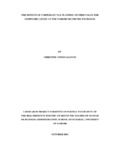| dc.description.abstract | Many studies suggest that the financial directors of most quoted firms consider the
reduction of their firm‟s effective tax rate as the main objective of their tax
department. Apparently, these firms believe that reducing the effective tax rate creates
value for their shareholders. Recent interviews with investors and financial analysts,
however, suggest they pay little attention to after tax earnings when valuing a firm.
These investors and analysts do not believe that a company can sustainably
outperform the firm‟s statutory tax rate. They also think that tax information in the
public accounts is so unclear that it is unusable for their valuations. Given this
background, the study sought to examine the effect of corporate tax planning on the
value of firms listed at the Nairobi Securities Exchange.
This study was designed as a causal predictive research design. Given that the purpose
of this study was to examine the effect of tax avoidance on financial performance, this
was the most appropriate design for the study. The population of this study was all the
companies listed on the Nairobi Securities Exchange. Secondary data was sourced
from the CMA, respective company websites, and The African Financials website on
the variables of interest for the five year period beginning 2009 to 2013 for 20
companies with complete data. A descriptive analysis was used to describe the data in
terms of mean scores and standard deviations among other descriptive statistics. In
order to examine the effect of tax planning on firm value, regression analysis was
carried out. Since the data collected was panel data, the analysis was performed using
panel data regression techniques with the aid of Eviews 7 analysis software.
The descriptive results showed that the mean firm value was 0.4551 while effective
tax rates averaged 23%. The major finding was that tax planning had a negative and
significant impact on the value of the firm (β = -0.05, p = 0.04). The study also
showed that board ownership had a positive but insignificant effect on firm value (β =
0.0006, p = 0.547). The results further showed that age of the firm had a negative
a negative and
significant effect on firm value (β = -0.01, p = 0.001). The study found that size of the
firm had a positive and significant effect on firm value (β = 0.002, p = 0.000). The
study revealed that leverage had a negative and significant effect on firm value (β = 0.585,
p = 0.002). The results further showed a negative but insignificant relationship
between asset tangibility and firm value (β = -0.01, p = 0.542). The results showed
that the F-statistic was 41.16 and significant, p < .001, thus suggesting that the model
was fit to explain the relationship between tax planning and firm value. From the R2
value, the model explained 95.7% of the variance in firm value. The study concludes
that tax planning influences the value of listed firms in Kenya. The study recommends
the need for firms to institute more robust tax planning practices that will help reduce
their effective tax liabilities and therefore improve their overall value. Firms that
engage in better tax planning practices are likely to get higher firm value | en_US |

